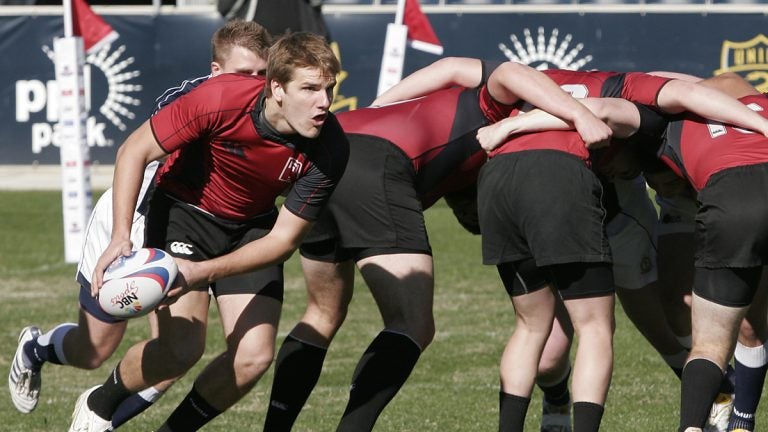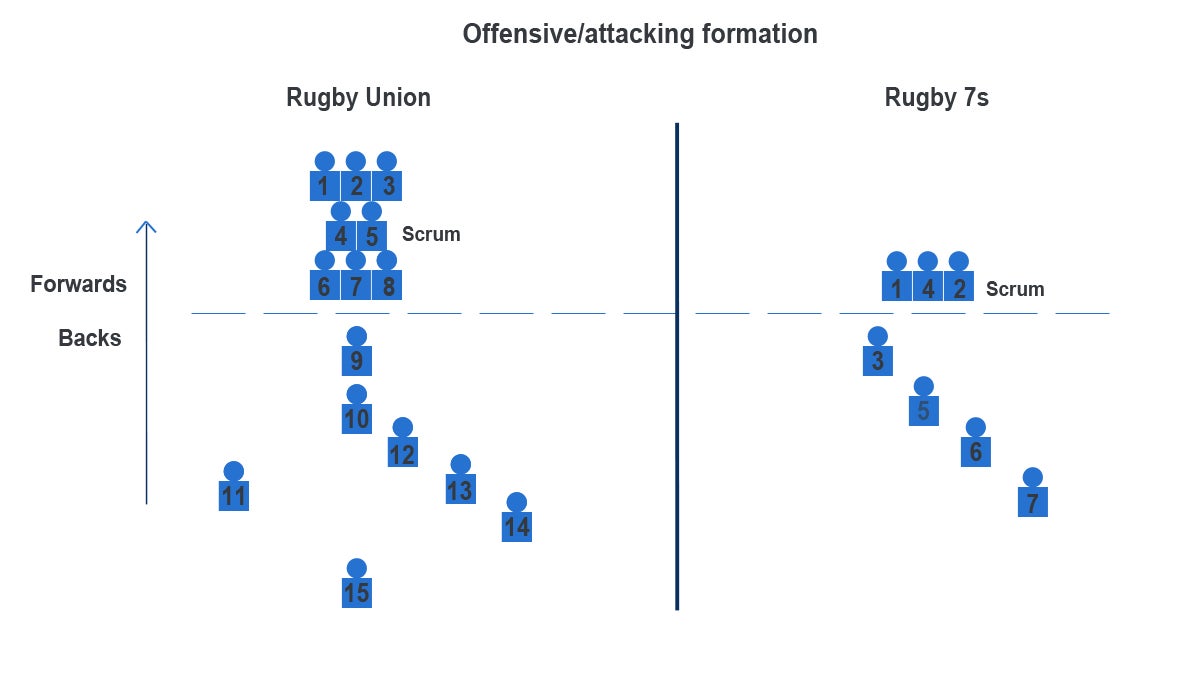Collegiate Rugby Championship in Chester your chance to preview newest Olympic sport

The Temple University scrum half is shown passing the ball out from the scrum in a rugby demonstration against Penn Sate University. (Mark Stehle/AP Images for USA 7's
This weekend, Talen Energy Stadium (formerly PPL Park) in Chester, Pennsylvania, will host the Penn Mutual Collegiate Rugby Championship (CRC), a two-day tournament created with one goal in mind: Get novices like you hooked on the Summer Olympics’ newest sport.
Don’t call it a comeback
The CRC was founded in 2010, a year after rugby sevens was added to the Rio 2016 lineup alongside golf and kitesurfing. NBC, which owns the broadcast rights to the Olympics, quickly signed up to air the tournament as a way of promoting the sport and building an audience before this summer’s games. Even though rugby is by some accounts America’s fastest-growing sport by participation, it’s still relatively unknown to U.S. audiences. This year, NBC Sports is dedicating a full 15 hours among NBC, NBCSN, and Comcast Sportsnet to the invitational tournament, which features some of the the nation’s best collegiate rugby programs.
Rugby is making a return of sorts to the Olympics: Rugby union, the more common 15-a-side version of the sport, was played in the Summer Games from 1900 to 1924. Back then, the differences between American football and rugby weren’t as pronounced. Ever wonder why gridiron football’s 6-point score is called a touchdown? In rugby, an offensive player doesn’t score until he or she touches the ball to the ground in the try zone (rugby’s version of an end zone). For whatever reason, football got rid of the touching-down but kept “touchdown,” whereas rugby kept the touching-down can called it a “try.” So, given how similar the sports were back then, it’s perhaps less surprising that the U.S. is the reigning Olympic rugby champion.
Rugby sevens, as the name implies, is a 7-on-7 version of the game with seven-minute halves instead of rugby union’s 40-minute halves. Both versions are played on pitches of the same size — a little longer than a football field, and with the goalposts placed at the front of the the try zone — so sevens players have much more territory to defend. There is a ton of space for fast players to spring through gaps. Sevens is a speedster’s game.

Many of the Team USA ruggers competed in the CRC, including team captain Madison Hughes, who led Dartmouth to two CRC championships in 2012 and 2013. Since then, Hughes has led the national squad, known as the Eagles, to its highest international ranking this year and last, 6th, which makes America a medal contender in Rio. And in its last international match before the Olympics, the USA Eagles defeated gold medal favorites Fiji to take third place in the London Sevens.
The rules
Unfamiliar with rugby’s rules? Here are the basics. Rugby is the evolutionary missing link between soccer’s elegant simplicity and football’s regimented beauty. Rugby lacks many of football’s rigid mutations: no pads, no forward pass, no blocking, no downs.
The ball must be passed backward, never forward. A player must move the ball forward on the field by kicking it or carrying it forward.
When a runner has been tackled, he or she must release the ball almost immediately; this can mean placing it on the ground, popping it to a teammate, or allowing an opposing player to wrest it from his or her grasp.
If the ball is placed on the ground, a pushing contest known as a ruck may be formed over the tackled player and the ball. The team that wins the ruck by pushing the other team back and exposing the ball can then pick up offensive play.
Major infractions, like playing offsides or tackling a player too high, result in a 10-meter penalty, which may be used by the fouled team to kick for points, which might remind football fans of a field goal. Minor fouls, like passing or dropping the ball in a forward direction, result in a scrum, another glorified pushing contest that is used to restart play. In a scrum, the larger players on the field, the forwards, link up in opposing clusters to compete for the ball, which is retrieved by the winning team and passed out to the leaner, faster players, the backs, to run it forward.
If a player kicks or carries the ball out of bounds, the other team gets to throw the ball back into play via a “lineout,” in which the opposing teams line up, and players are allowed to lift each other to reach for the ball.
The complete rules are a bit more complicated than that: Published as the “Laws of Rugby,” they run closer to 150 pages than a few paragraphs, after all.
Don’t panic!
If you watch at home, the TV commentators will provide a continuous rundown of the rules, replete with video demonstrations. If you decide to venture to Talen Energy Stadium to watch live — tickets are still available and scalping in the stadium parking lots will only be outpaced by tailgating — simply sit near some more experienced fans (You’ll be able to spot them), and ask away. Rugby fans have the kind of proselytizing zeal that would shame a Scientologist; most will gladly chat your ear off explicating all of the sport’s kinetic ins and outs.
But you don’t really need to know the rules to enjoy rugby. You already know to expect massive hits, but what really excites die-hard rugby fans are the offloads — the passes made just as a player is being tackled. Rugby sevens at its most fun resembles an American football option offense loaded up with reverses and other trick plays: It’s wild, unpredictable — an offense with seven quarterbacks and seven eligible receivers, a defense with seven heat-seeking free safeties.
Men’s and women’s teams to watch out for
If you want to hide your ignorance about the game a bit, here’s some chatter to throw out while you’re waiting in the beer line: Pennsylvania’s very own Kutztown is this year’s men’s team to watch, having lost in the last two CRC finals to Cal, collegiate rugby’s unquestioned ultimate powerhouse program.
Expect Life University — a tiny chiropractic school in Georgia virtually unheard of outside of rugby circles — to also make it deep in the tournament.
Closer to home, Penn State should make a solid run, and Temple is considered to be this year’s sleeper. St. Joseph’s and Drexel also made the tournament, but they face tough draws in Saturday’s pool competition.
Things get a little less interesting on the women’s side: Penn State has won the CRC three years running in dominant fashion and looks to add a fourth title this year. Among regional squads, the Nittany Lions will be joined by University of Delaware Women, Kutztown, Rutgers, Temple, and Princeton.
Most of the women’s games will be played at the newly built Academy Fields directly adjacent next to Talen Energy Stadium. A national high school invitational tournament will also be held at those fields.
The Rio Olympics are just two months away, making this your last, best chance to impress your friends and coworkers with your rugby intelligence. Then again, “rugby intelligence” may be something of an oxymoron: The sport’s concussion rate is over four times that of American football. But that’s another story.
WHYY is your source for fact-based, in-depth journalism and information. As a nonprofit organization, we rely on financial support from readers like you. Please give today.




